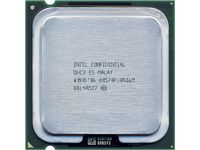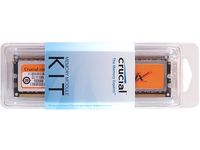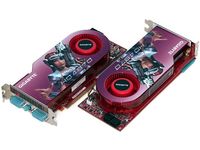PCI Express & CrossFire: Scaling Explored
Test Settings
| Component | Base Settings |
|---|---|
| CPU | Intel Core 2 Duo E8600, (3.33GHz, 6.0 MB Cache)Overclocked to 4.00 GHz, FSB-1600 |
| Memory | 2 x 2.0 GB Crucial Ballistix PC2-6400Set to 800MHz data rate, CAS 4-4-4-10 |
| Graphics | 2 x Gigabyte GV-R487-512H-BHD 4870 GPU (750 MHz), GDDR5-3600 |
| Hard Drive | Western Digital WD5000AAKS, 500 GB7,200 RPM, SATA 3 Gb/s, 16 MB cache |
| Sound | Integrated HD Audio |
| Network | Integrated Gigabit Networking |
| Power | Cooler Master RS850-EMBA (850W, ATX12V v2.2) |
| Software and Drivers | Row 7 - Cell 1 |
| Operating System | Windows Vista Ultimate SP1 |
| Graphics Driver | AMD Catalyst 8.9 |
| Onboard Device Drivers | Motherboard Driver DVD |
While many of our test games show enormous performance gains from higher clock speed, none have shown significant improvements in the transition from two to four cores. Thus, we used a dual-core processor that usually overclocks beyond 4 GHz on air cooling. Intel’s Core 2 Duo E8600 is probably the best gaming processor owners of LGA775 motherboards can hope for their motherboards to support because it starts out as Intel’s highest-frequency model and is easily pushed beyond the speeds other processors can reliably run.
Overclocked to 4.0 GHz at FSB-1600, our Core 2 Duo E8600 required good RAM to achieve optimal throughput. Unfortunately, the oldest chipset in today’s line-up wasn’t designed to support DDR2-1066, and using the DDR2-1000 setting resulted in severe instability. Without the ability to increase memory speed, we instead settled for tight CAS 4 latencies at DDR2-800 and 2.00 volts. Crucial’s Ballistix DDR2-800 4.0 GB dual-channel kit worked perfectly.
With the support hardware in place, it was time to pick graphics cards. Though the targeted upgrade market of this piece will likely favor lower-cost HD 4850 or HD 4830 based graphics models, the HD 4870 allows us to test the limit of motherboard differences when using the same architecture as those two high-value solutions. A pair of Gigabyte’s GV-R487-512H-B graphics cards suited our testing needs well.
To further examine graphics performance differences, we added Race Driver GRID to our regular selection of benchmarks.
| Crysis | Version: 1.2.1Test 1: Low Details, No AATest 2: Very High Details, 8x AADemo: CPU-Benchmark + Tom’s Hardware Tool |
| Race Driver:GRID | Version: 1.20.0000Test 1: Low Details, No AATest 2: Very High Details, 8x AATrack: Jarama |
| Supreme CommanderForged Alliance | Version: 1.5.3599Test 1: Low Details, No AATest 2: Very High Details, 8x AADemo: WallaceTX_006_006Benchmark: Fraps 2.9.4 - Build 7037 |
| Unreal Tournament 3 | Version: 1.2Sound and DirectX10Texture Details: 1Level Details: 1Demo: vCTF-Reflection_flyTime: 12/60 |
| World in Conflict | Version: 1.0.0.9Test 1: Very Low details (No AA, No AF)Test 2: Very High details (4x AA, 4x AF)Demo: Game-Benchmark |
| 3DMark Vantage | Version: 1.02GPU and CPU scores |
| SiSoftware Sandra XII SP2 | Version 2008.5.14.24CPU Test = CPU Arithmetic / MultimediaMemory Test = Bandwidth Benchmark |
Because different generations of chipset support different bus speeds, we also included Sandra’s CPU and memory bandwidth benchmarks to gauge the effects chipset overclocking had on performance.
Get Tom's Hardware's best news and in-depth reviews, straight to your inbox.
Current page: Test Settings
Prev Page Every Generation Of Core 2 Chipset? Next Page Test Results: Synthetics-
sparky2010 should've included 1920x resolutions in the last page, as there are a lot of people out there with screens capable of that resolution.. but anyways, all in all a very good and informative article.. but i'm going to settle with a complete makeover when core i7 becomes more available!Reply -
V3NOM yer kinda interesting to see how things have changed with new mobos but it doesnt really have any practical value tbh.Reply -
Crashman V3NOMyer kinda interesting to see how things have changed with new mobos but it doesnt really have any practical value tbh.Reply
It's all about answering the question "Will a second card do the job".
Lots of guys have midrange or better ATI graphics cards, and the question of "upgrade or replace" is constantly being asked. -
outlw6669 @ arkadiReply
Yes the x58 is out.
However, as it can not be paired with a Core 2 CPU and runs DDR3 exclusively, you can not directly compare the results.
In general, I would assume crossfire on the x58 will scale similarly to the x38/48 as they both have the same PCIe configuration. -
Crashman outlw6669Thanks for finally getting this review out!Reply
It was planned for September but kept getting delayed due to tight deadlines on other articles. But when the economy finally went from a slow decline to a nosedive in November, we knew this article had to come out right away. More people are putting new systems on hold and looking for ways to keep their old ones up to current performance standards, and we care about upgraders just as much as system builders.



